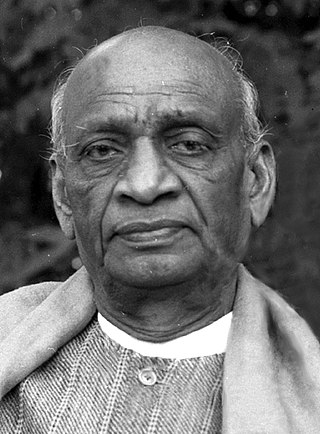
Vallabhbhai Jhaverbhai Patel, commonly known as Sardar Vallabhbhai Patel, was an Indian independence activist and statesman who served as the first Deputy Prime Minister and Home Minister of India from 1947 to 1950. He was a senior leader of the Indian National Congress, who played a significant role in the Indian independence movement and India's political integration. In India and elsewhere, he was often called Sardar, meaning "Chief" in Hindi, Urdu, Bengali and Persian. He acted as the Home Minister during the political integration of India and the Indo-Pakistani War of 1947.

Rashtriya Swayamsevak Sangh is an Indian right-wing, Hindu nationalist volunteer paramilitary organisation. It is the progenitor and leader of a large body of organisations called the Sangh Parivar, which has developed a presence in all facets of Indian society and includes the Bharatiya Janata Party, the ruling political party under Narendra Modi, the 14th prime minister of India. Mohan Bhagwat has served as the Sarsanghchalak of the RSS since March 2009.

The Indian Independence Movement was a series of historic events in South Asia with the ultimate aim of ending British colonial rule. It lasted until 1947, when the Indian Independence Act 1947 was passed.

The partition of India in 1947 was the division of British India into two independent dominion states, Union of India and Dominion of Pakistan. The Union of India is today the Republic of India and Dominion of Pakistan, the Islamic Republic of Pakistan and the People's Republic of Bangladesh. The partition involved the division of two provinces, Bengal and the Punjab, based on district-wise Hindu or Muslim majorities. It also involved the division of the British Indian Army, the Royal Indian Navy, the Indian Civil Service, the railways, and the central treasury, between the two new dominions. The partition was set forth in the Indian Independence Act 1947 and resulted in the dissolution of the British Raj, or Crown rule in India. The two self-governing countries of India and Pakistan legally came into existence at midnight on 14–15 August 1947.
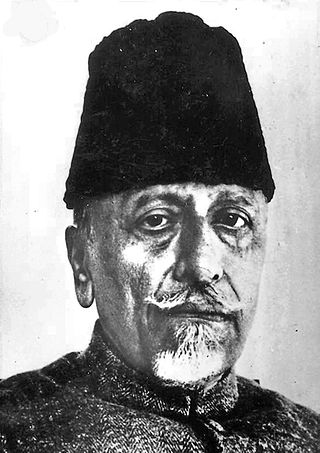
Abul Kalam Ghulam Muhiyuddin Ahmed bin Khairuddin Al-Hussaini Azad ; 11 November 1888 – 22 February 1958) was an Indian independence activist, writer and a senior leader of the Indian National Congress. Following India's independence, he became the First Minister of Education in the Indian government. He is commonly remembered as Maulana Azad; the word Maulana is an honorific meaning 'Our Master' and he had adopted Azad (Free) as his pen name. His contribution to establishing the education foundation in India is recognised by celebrating his birthday as National Education Day across India.
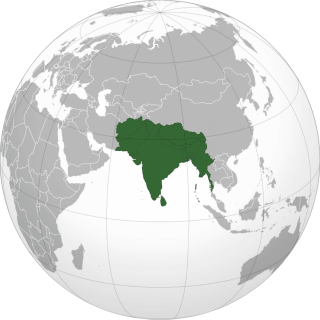
Akhand Bharat, also known as Akhand Hindustan, is a term for the concept of a unified Greater India. It asserts that modern-day Afghanistan, Bangladesh, Bhutan, India, Maldives, Myanmar, Nepal, Pakistan, Sri Lanka and Tibet are one nation.
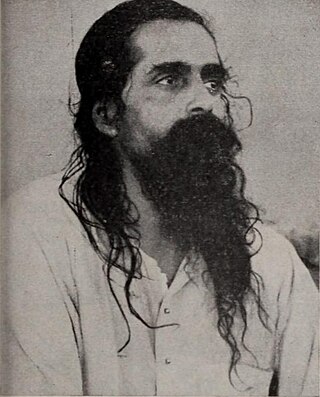
Madhav Sadashivrao Golwalkar, popularly known as Guruji, was the second Sarsanghchalak ("Chief") of the Hindutva organisation Rashtriya Swayamsevak Sangh (RSS). Golwalkar is considered one of the most influential and prominent figures among Rashtriya Swayamsevak Sangh by his followers.
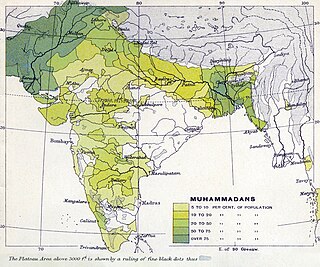
The two-nation theory was an ideology of religious nationalism that advocated Muslim Indian nationhood, with separate homelands for Indian Muslims and Indian Hindus within a decolonised British India, which ultimately led to the Partition of India in 1947. Its various descriptions of religious differences were the main factor in Muslim separatist thought in the Indian subcontinent, asserting that Indian Muslims and Indian Hindus are two separate nations, each with their own customs, traditions, art, architecture, literature, interests, and ways of life.

Indian nationalism is an instance of territorial nationalism, which is inclusive of all of the people of India, despite their diverse ethnic, linguistic and religious backgrounds. Indian nationalism can trace roots to pre-colonial India, but was fully developed during the Indian independence movement which campaigned for independence from British rule. Indian nationalism quickly rose to popularity in India through these united anti-colonial coalitions and movements. Independence movement figures like Mahatma Gandhi, Subhas Chandra Bose, and Jawaharlal Nehru spearheaded the Indian nationalist movement. After Indian Independence, Nehru and his successors continued to campaign on Indian nationalism in face of border wars with both China and Pakistan. After the Indo-Pakistan War of 1971 and the Bangladesh Liberation War, Indian nationalism reached its post-independence peak. However by the 1980s, religious tensions reached a melting point and Indian nationalism sluggishly collapsed in the following decades. Despite its decline and the rise of religious nationalism, Indian nationalism and its historic figures continue to strongly influence the politics of India and reflect an opposition to the sectarian strands of Hindu nationalism and Muslim nationalism.
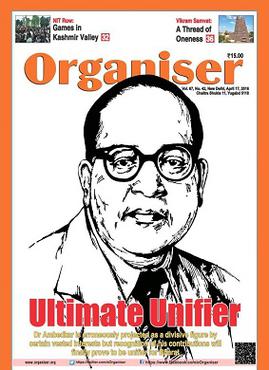
Organiser is a mouthpiece of the Hindu nationalist and voluntary organisation Rashtriya Swayamsevak Sangh (RSS). It was launched as a newspaper in 1947 in the weeks before the Partition of India. The newspaper has been edited by A. R. Nair, K. R. Malkani, L. K. Advani, V. P. Bhatia, Seshadri Chari and Dr R. Balashanker. It has promoted misinformation on many occasions.

Madhukar Dattatraya Deoras, was the third Sarsanghchalak of the Rashtriya Swayamsevak Sangh (RSS).
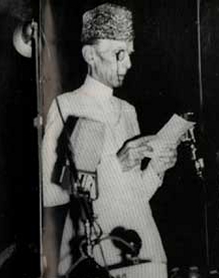
Muhammad Ali Jinnah's 11 August Speech is a speech made by Muhammad Ali Jinnah, founding father of Pakistan and known as Quaid-e-Azam to the Constituent Assembly of Pakistan. While Pakistan was created as a result of what could be described as Indian Muslim nationalism, Jinnah was once an ambassador of Hindu-Muslim unity. When the Partition of India finally occurred, Jinnah, soon-to-be Governor-General of the Dominion of Pakistan, outlined his vision of Pakistan in an address to the Constituent Assembly, delivered on 11 August 1947. He spoke of an inclusive and impartial government, religious freedom, rule of law ,and equality for all.
Hindu Revolution is a term in Hindu nationalism referring to a sociopolitical movement aiming to overthrow untouchability and casteism to unified social and political community to create the foundations of a modern nation.
Hindu nationalism has been collectively referred to as the expression of political thought, based on the native social and cultural traditions of the Indian subcontinent. "Hindu nationalism" is a simplistic translation of Hindū Rāṣṭravād. It is better described as "Hindu polity".

Indian reunification refers to the potential reunification of India with Pakistan and Bangladesh, which were partitioned from British India in 1947.

After the Partition of India, during October–November 1947 in the Jammu region of the princely state of Jammu and Kashmir, many Muslims were massacred and others driven away to West Punjab. The killings were carried out by extremist Hindus and Sikhs, aided and abetted by the forces of Maharaja Hari Singh. The activists of the Rashtriya Swayamsevak Sangh (RSS) played a key role in planning and executing the riots. An estimated 20,000–100,000 Muslims were massacred. Subsequently, many non-Muslims were massacred by Pakistani tribesmen, in the Mirpur region of today's Pakistani administered Kashmir, and also in the Rajouri area of Jammu division.

Opposition to the Partition of India was widespread in British India in the 20th century and it continues to remain a talking point in South Asian politics. Those who opposed it often adhered to the doctrine of composite nationalism in the Indian subcontinent. The Hindu, Christian, Anglo-Indian, Parsi and Sikh communities were largely opposed to the Partition of India, as were many Muslims.

Hindu–Muslim unity is a religiopolitical concept in the Indian subcontinent which stresses members of the two largest faith groups there, Hindus and Muslims, working together for the common good. The concept was championed by various persons, such as leaders in the Indian independence movement, namely Mahatma Gandhi and Khan Abdul Ghaffar Khan, as well as by political parties and movements in British India, such as the Indian National Congress, Khudai Khidmatgar and All India Azad Muslim Conference. Those who opposed the partition of India often adhered to the doctrine of composite nationalism.

Composite nationalism is a concept that argues that the Indian nation is made up of people of diverse ethnicities, cultures, tribes, castes, communities, and faiths. The idea teaches that "nationalism cannot be defined by religion in India." While Indian citizens maintain their distinctive religious traditions, they are members of one united Indian nation. Composite nationalism maintains that prior to the arrival of the British into the subcontinent, no enmity between people of different religious faiths existed; and as such these artificial divisions can be overcome by Indian society.
The All India Conference of Indian Christians (AICIC) is an ecumenical organisation founded in 1914 to represent the interests of Christians in India. It was founded to advocate for the moral, economic, and intellectual development of the Indian Christian community. The All India Conference of Indian Christians held its first meeting on 28 December 1914 and was led by Raja Sir Harnam Singh of Kapurthala, who was the president of the National Missionary Society (NMS); the first AICIC General Secretary was B. L. Rallia Ram of Lahore. Its creation united local and regional Indian Christian Associations, which existed in Bombay, Madras, Hyderabad, Punjab, United Provinces, Bengal and Burma, under one umbrella organisation. At the time of the Indian independence movement, the organisation allied itself with the Indian National Congress and the resolutions passed by All India Conference of Indian Christians advocated communal harmony, while also pressing for the rights of Christians in both colonial India and independent India. The India Conference of Indian Christians advocated for self-rule in a united and independent country, opposing the partition of India. During the era of the British Raj in India, the AICIC served as the mouthpiece for members of the Indian Christian community, conducting membership drives to boost its base, which included Protestant and Catholic Christians. As such, the presidents of the AICIC represented the Christians of undivided India at the Round Table Conferences.
















